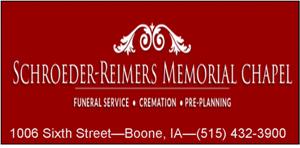BOONE, Iowa—The Annual Meeting for the Boone County Historical Center drew a large and loud crowd Thursday night. The meeting was to consider the voting results by membership for a change in bylaws, something that has not been updated since 2006, and the filling of two-positions on the Historical Society Board of Directors. However, even before the business portion of the meeting could commence, there was an objection to the proceedings by Boone Attorney Mike Mahoney. He challenged the legality of the meeting under Iowa Code. Ryan Mahoney raised several legal issues as well particularly pertaining to the internal operation of the Board of Directors for the Historical Society. He also objected to the proposed change in the bylaws, claiming they had not been available prior to the meeting. Historical Society Executive Director Mara MacKay said that the proposed changes in the bylaws were available on request. Both attorneys were then escorted from the meeting and they were joined by several others. The future of the Mamie Doud Eisenhower Birthplace has been the focal point for the disagreement that’s developed in the community.
The last call for votes was made at 6:30. As to the open Board positions, Nathan Lake received 86 votes, and Robin Crouch received 85. Both of these candidates were on the ballot and will take their place on the Board at the next meeting. Write in votes included Judy Russell with 30 votes and Mary Anderson with 29 votes. A number of others received fewer than five votes each. As to the changes to the bylaws, there were approved with 89 yes votes and 29 no votes. There were 9 blank ballots.
Topics during the Open Comment portion of the meeting included an endorsement of YesterBoone. There was a plea to the Board to reconsider “destroying” the 2nd floor 20th Century Gallery. There were also questions as to why the Mamie Doud Eisenhower Birthplace required professionals on site, its safety and a report of how money was spent at the Birthplace. The matter of the bylaws also resurfaced when a question was raised about how the bylaws could be voted upon when they had not been seen by the members in advance.

An expected large crowd did turnout Monday for the Boone County Historical Society Annual Meeting









